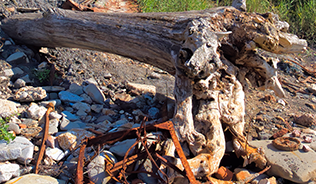In partnership with the Ireland Brownfield Network (IBN), a virtual event was held to explore the challenges, opportunities and regulatory requirements of managing waste soils on development sites across the island of Ireland. Relevant to consultants, landowners, developers and designers, the event featured talks from industry leaders and regulators, and breakout sessions which allowed participants to collectively explore EU- and UK-compliant waste soil management approaches and challenges. The event featured the following presentations which can be watched in the recording below:
- Philip Nugent, Assistant Secretary in the Department of Environment, Climate, Communications: Implementing the circular economy - WFD and development related waste soils
- Caitriona Collins, Senior Inspector at the Environmental Protection Agency: Regulation and management of excess soil and stone in the Republic of Ireland
- Brain McVeigh, Principal Scientific Officer at the Northern Ireland Environment Agency: Managing waste soils on development sites: a Northern Ireland perspective
The event marks the start of a new IBN-led initiative specifically addressing waste soils. It provided participants with the opportunity to shape future outputs so that pragmatic and sustainable solutions are developed that support brownfield redevelopment.
Summary of breakout discussions
Breakout discussions explored the barriers to the reduction and reuse of waste soils, waste classification approaches to waste soils, and waste disposal and treatment options for waste soils on the island of Ireland.
Key messages included the importance of circular economy approaches to managing waste soils moving forward, the requirement for mechanisms and practical ways to support the implementation of legislation, and the need for education around waste identification and classification.
Other discussion points:
- A key barrier to hitting the ambitious target of reusing 70% of waste soils is the inefficiency of waste identification in a project. Therefore, there is a need for earlier identification of waste in a project lifecycle.
- A potential area that the IBN could support the achievement of this target is through profile raising of the importance of earlier identification of waste and educating key decision-makers on this.
- Connecting those with excess materials with those needing materials is another opportunity for improving the proportion of waste soils being reused.
- How do we determine the definition of contaminated and uncontaminated soils, and how does this overlap with the management of soils within waste legislation.
- Some recovery sites have started engaging in developing site specific acceptance criteria which may differ from generic criteria. While this may present greater opportunity for disposal route identification, it does present some challenges in planning and screening of waste.
- A risk based approach to determining and defining contamination should be explored.
- Common errors found in waste classification submissions include inadequate methodologies and unrepresentative data.
- The alignment between the Northern Ireland Waste Management Framework and the EU Waste Framework Directive provides the potential for cross-boundary collaboration between regulatory approaches and scope for the development of all-Ireland guidance in this area.





